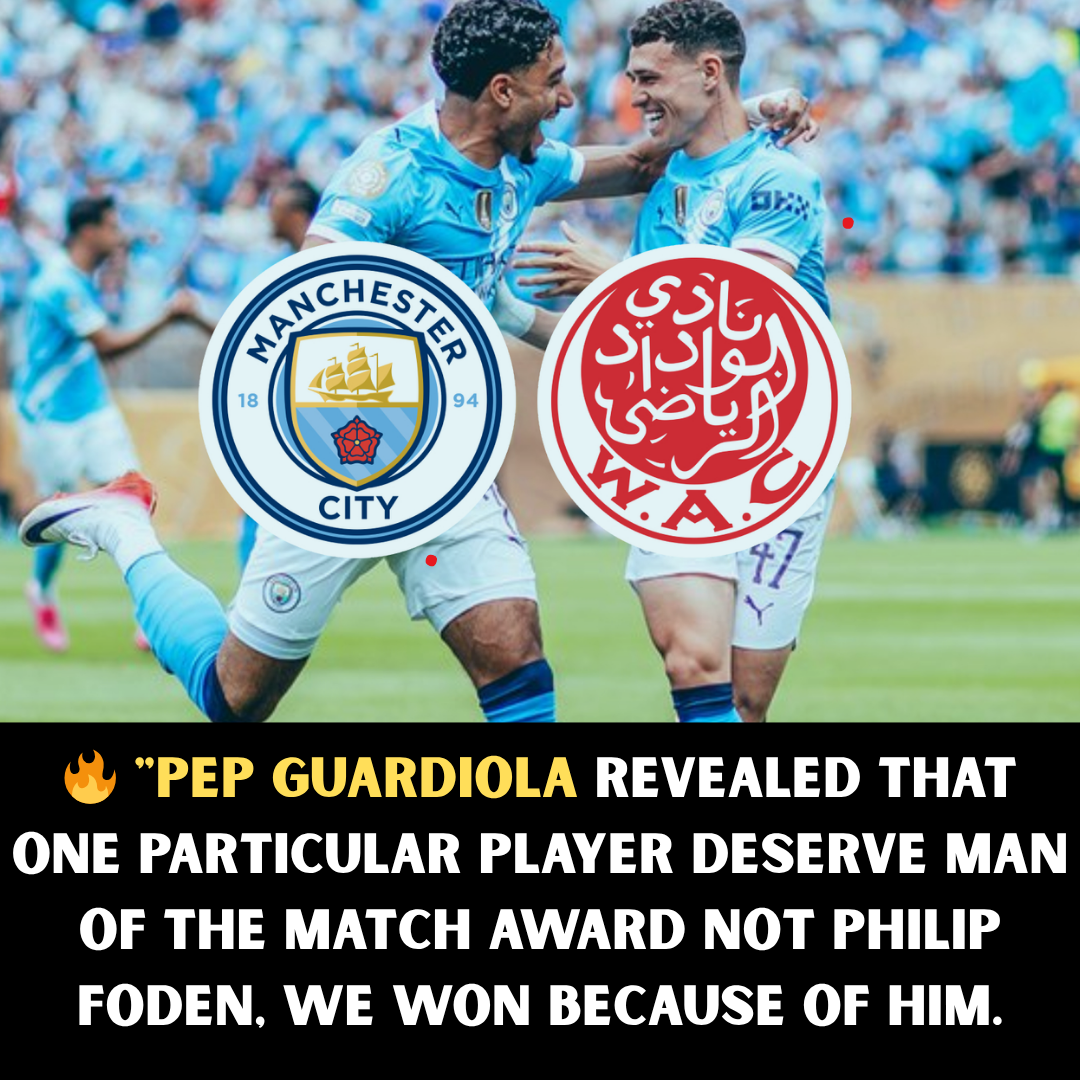Man City player ratings vs Wydad with two 8/10s as Foden Shine…

The FIFA Club World Cup 2025 commenced with a statement of intent from Manchester City, as Pep Guardiola’s men secured a commanding 2-0 victory over Moroccan champions Wydad Casablanca at Lincoln Financial Field in Philadelphia. What appeared on the surface as a routine opening victory carried deeper narratives of redemption, tactical experimentation, and the ongoing evolution of City’s squad dynamics in their pursuit of global supremacy.
The Return of Phil Foden: A Tale of Redemption
Perhaps no individual performance carried more significance than Phil Foden’s resurgent display against Wydad. The English midfielder, who endured what can only be described as a torturous 2024-25 season, found himself at the center of City’s attacking thrust with a performance that hinted at a return to his scintillating best. Having publicly acknowledged mental health struggles as a contributing factor to his decline, Foden’s early goal represented more than just three points for his team—it symbolized the beginning of what could be a remarkable personal renaissance.
The opener arrived with breathtaking speed, Foden pouncing on goalkeeper Mehdi Benabid’s miscued punch clearance to fire home after just two minutes. This represented his first goal in five months, a drought that had become emblematic of his broader struggles throughout the previous season. The manner of the finish—instinctive, clinical, and decisive—recalled the Foden of old, the player who had established himself as one of Europe’s most promising young talents.
But Foden’s contribution extended far beyond his goal. His corner delivery for Jeremy Doku’s strike demonstrated the kind of creative spark that had been largely absent from his recent performances. The arcing cross was perfectly weighted, inviting Doku to attack the ball with conviction and find the net with a well-taken volley. This assist showcased Foden’s ability to influence games from various positions and situations, a versatility that has always been central to his value within Guardiola’s system.
The performance wasn’t without its blemishes. A glaring miss when presented with a straightforward opportunity in the first half served as a reminder that complete confidence hasn’t yet returned. However, these moments of fallibility seemed less significant in the context of an overall display that radiated renewed energy and purpose. For a player whose career had seemed to stagnate, this Club World Cup opener represented a potential turning point.
Tactical Innovation and Squad Rotation
Guardiola’s team selection revealed the careful balancing act required in tournament football. The Catalan coach opted for what could be described as an ultra-attacking formation, sacrificing some defensive solidity in favor of overwhelming offensive firepower. This approach served multiple purposes: it allowed key players to be rested while giving fringe players valuable minutes, and it provided an opportunity to experiment with tactical variations that could prove crucial in later stages of the competition.
The inclusion of debutant Rayan Cherki in the starting lineup represented one of the most intriguing aspects of Guardiola’s selection. The French playmaker, acquired during the winter transfer window, was thrust into action with the expectation that his creativity and technical ability would complement City’s established stars. However, his debut proved somewhat underwhelming, lacking the immediate impact that many had anticipated following his confident pre-match interviews.
Cherki’s performance highlighted the challenges faced by new signings attempting to integrate into Guardiola’s complex tactical system. While he demonstrated glimpses of his undoubted technical ability and showed promising early signs of understanding with Brazilian winger Savinho, his overall contribution fell short of expectations. A loose pass that led to a dangerous long-range effort from Wydad served as a reminder that adaptation to City’s high-intensity pressing system requires time and patience.
The midfield composition, featuring Tijjani Reijnders in his debut appearance, showcased Guardiola’s ongoing efforts to refresh his squad’s dynamics. Reijnders appeared comfortable in orchestrating City’s possession-based approach, though his attacking contributions were somewhat limited by the team’s formation and the specific demands of his role. His performance suggested a player with the technical foundation to succeed in City’s system, though like Cherki, full integration will likely require additional time and exposure to Guardiola’s methods.
Jeremy Doku: The Standout Performer
While Foden’s redemption story captured headlines, Jeremy Doku’s electrifying display provided perhaps the most consistent entertainment throughout the ninety minutes. The Belgian winger has gradually established himself as one of City’s most exciting attacking weapons, and his performance against Wydad reinforced his growing importance within the squad hierarchy.
Doku’s involvement in the opening goal demonstrated his ability to create chaos in tight spaces. His quick feet and direct running style consistently troubled Wydad’s defensive structure, creating the kind of uncertainty that led to Benabid’s fateful decision to punch rather than catch Savinho’s cross. This indirect contribution to City’s opener was followed by a more direct impact just before halftime.
The second goal showcased Doku’s finishing ability and spatial awareness. Meeting Foden’s corner with a perfectly timed volley, he demonstrated the kind of clinical edge that separates good wingers from great ones. The technique required to generate power and accuracy from such a position, while under pressure from defending players, highlighted the Belgian’s continued development as a complete attacking threat.
Throughout the match, Doku’s willingness to take on defenders in one-on-one situations created numerous opportunities for City to exploit spaces in behind Wydad’s defensive line. His pace and direct style provided a different dimension to City’s attack, complementing the more intricate passing combinations that typically characterize their play. A missed opportunity in the second half, where he shot too close to Benabid when well-placed, represented the only significant blemish on an otherwise outstanding individual performance.
The decision to substitute Doku after sixty minutes felt somewhat harsh given his influence on the game, though it likely reflected Guardiola’s desire to manage his key players’ workload across what promises to be a demanding tournament schedule.
Defensive Concerns and Vitor Reis’s Growing Pains
While City’s attacking play provided plenty of encouragement, their defensive performance raised some concerns that could prove problematic against higher-quality opposition. The most glaring issues centered around young defender Vitor Reis, whose inexperience was exposed on several occasions throughout the match.
Reis’s most significant error came when he misjudged a bouncing ball, allowing Thembinkosi Lorch to steal possession and create a clear opportunity for Wydad. Only Lorch’s loss of footing prevented what could have been a straightforward equalizer, highlighting how fine the margins can be at this level of competition. Such lapses in concentration and positional awareness could prove costly against teams with more clinical finishing ability.
The Brazilian’s aerial play also left room for improvement, as evidenced by a header from a corner kick that sailed harmlessly over the crossbar. For a player of his physical stature, more consistent aerial threat should be expected, particularly given City’s emphasis on set-piece situations as potential scoring opportunities.
However, it would be unfair to judge Reis too harshly based on a single performance. The step up from youth football to senior international competition represents a significant challenge, and these early experiences should provide valuable learning opportunities. Guardiola’s faith in young players has historically been rewarded, and Reis’s long-term development remains promising despite these early growing pains.
The broader defensive structure showed signs of vulnerability that better teams might exploit more effectively than Wydad managed. The decision to employ such an attacking formation inevitably left spaces that could be exploited by more technically proficient opposition, suggesting that tactical adjustments may be necessary as the tournament progresses.
Rico Lewis’s Controversial Dismissal
The match’s most controversial moment arrived in added time when Rico Lewis received a straight red card for what appeared to be a relatively innocuous challenge. The dismissal seemed harsh given the context of the match and the nature of the contact, though such decisions often appear magnified in the heat of competitive action.
Lewis had been one of City’s more consistent performers throughout the match, spending considerable time patrolling midfield and helping his team maintain control of possession. His versatility in transitioning between defensive and midfield duties exemplified the kind of tactical flexibility that Guardiola values in his players.
The red card serves as a reminder of the fine lines that exist in tournament football, where accumulated yellow cards and suspensions can significantly impact squad rotation and tactical planning. For Lewis personally, the dismissal represents a disappointing end to what had been a solid individual performance, though his overall contribution to the victory shouldn’t be overshadowed by the late controversy.
Wydad Casablanca’s Brave but Limited Challenge
Credit must be given to Wydad Casablanca for their spirited performance despite facing overwhelming odds against one of Europe’s premier clubs. The Moroccan champions demonstrated admirable organization and discipline, particularly in the second half when City’s intensity naturally decreased following their commanding first-half performance.
Wydad’s best opportunities came through quick transitions and moments of individual brilliance rather than sustained pressure, reflecting the significant gap in resources and technical ability between the two teams. Thembinkosi Lorch’s pace and direct running provided their most consistent threat, while Mohamed Moufid’s audacious long-range effort demonstrated the kind of ambition required when facing superior opposition.
Goalkeeper Mehdi Benabid, despite his early error that led to City’s opener, recovered to make several important saves that prevented a more comprehensive defeat. His stop to deny Foden a second goal and his positioning to thwart Doku’s second-half effort showed the kind of resilience that has characterized Wydad’s journey to this stage of the competition.
The performance, while ultimately unsuccessful, provided valuable experience for a club rarely afforded opportunities to test themselves against European elite opposition. Such matches serve important purposes in the global development of football, offering exposure and learning opportunities that can benefit entire domestic leagues and regional football infrastructure.
Substitutions and squad Management
Guardiola’s use of substitutions throughout the match revealed both his tactical acumen and his awareness of the broader tournament context. The introduction of Erling Haaland provided City with a different attacking dimension, though the Norwegian striker was unable to convert either of his two significant opportunities.
Haaland’s missed one-on-one with Benabid represented the kind of chance he would typically convert with ruthless efficiency. While such misses can happen to any striker, his inability to add to City’s tally meant that the victory margin didn’t fully reflect their dominance throughout the match.
The introduction of Rodri for his second appearance since recovering from knee surgery provided important minutes for a player crucial to City’s long-term tournament ambitions. Though he appeared somewhat rusty, which was to be expected given his limited recent playing time, his presence added stability to City’s midfield structure.
Ilkay Gundogan’s entry helped maintain City’s control during the final phases of the match, his experience and positional discipline ensuring that Wydad’s late efforts to reduce the deficit were effectively neutralized. Such squad depth represents one of City’s significant advantages in tournament competition, where the ability to maintain quality throughout tactical changes often proves decisive.
Looking Forward: Tournament Implications
This opening victory, while comfortable, serves as just the first step in what City hopes will be a successful Club World Cup campaign. The performance provided several positive indicators while also highlighting areas requiring attention as the competition intensifies.
Foden’s return to form represents perhaps the most encouraging development, given his potential importance to City’s creative output throughout the tournament. If he can maintain this level of performance, City’s attacking options become significantly more varied and unpredictable.
The defensive concerns, particularly around Reis’s adaptation to senior football, will require careful management and possible tactical adjustments. Against higher-quality opposition, such vulnerabilities could prove more costly than they were against Wydad.
The integration of new signings like Cherki and Reijnders remains a work in progress, though both showed enough promise to suggest they could play important roles as the tournament develops. Guardiola’s ability to blend established stars with new acquisitions will likely prove crucial to City’s ultimate success.
Conclusion: A Solid Foundation
Manchester City’s 2-0 victory over Wydad Casablanca provided exactly what Guardiola would have hoped for from a tournament opener: three points secured without major injury concerns, valuable minutes for fringe players, and encouraging signs from key individuals returning from difficult periods.
While the performance wasn’t without its flaws, the combination of Foden’s redemption story, Doku’s continued excellence, and the squad’s overall professional approach created a solid foundation for the challenges ahead. The Club World Cup represents an opportunity for City to add another significant trophy to their collection while providing a platform for both established stars and emerging talents to showcase their abilities on the global stage.
As the tournament progresses, the lessons learned from this opening encounter—both positive and concerning—will undoubtedly inform Guardiola’s tactical decisions and squad management. For now, City can be satisfied with a job well done, though they’ll be acutely aware that much sterner tests await in their pursuit of global supremacy.















